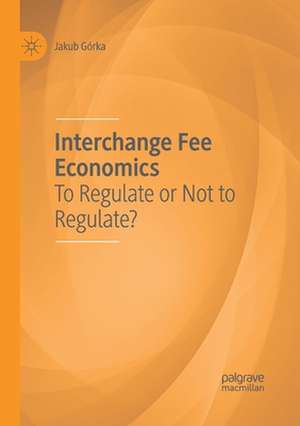Interchange Fee Economics: To Regulate or Not to Regulate?
Autor Jakub Górkaen Limba Engleză Paperback – 23 dec 2019
| Toate formatele și edițiile | Preț | Express |
|---|---|---|
| Paperback (1) | 480.44 lei 6-8 săpt. | |
| Springer – 23 dec 2019 | 480.44 lei 6-8 săpt. | |
| Hardback (1) | 582.95 lei 6-8 săpt. | |
| Springer International Publishing – 10 dec 2018 | 582.95 lei 6-8 săpt. |
Preț: 480.44 lei
Nou
Puncte Express: 721
Preț estimativ în valută:
91.96€ • 99.92$ • 77.30£
91.96€ • 99.92$ • 77.30£
Carte tipărită la comandă
Livrare economică 21 aprilie-05 mai
Preluare comenzi: 021 569.72.76
Specificații
ISBN-13: 9783030404918
ISBN-10: 3030404919
Dimensiuni: 155 x 235 mm
Greutate: 0.25 kg
Ediția:1st ed. 2018
Editura: Springer
Colecția Palgrave Macmillan
Locul publicării:Cham, Switzerland
ISBN-10: 3030404919
Dimensiuni: 155 x 235 mm
Greutate: 0.25 kg
Ediția:1st ed. 2018
Editura: Springer
Colecția Palgrave Macmillan
Locul publicării:Cham, Switzerland
Cuprins
Chapter
1:
Two-Sided
Markets
and
Interchange
Fees.-
Chapter
2.
Interchange
Fee
Reforms
in
Various
Countries.-
Chapter
3.
Empirical
Investigation
of
the
Polish
Interchange
Fee
Reform
Effects.-
Chapter
4.
Final
Remarks.
Notă biografică
Jakub
Górkaholds
a
PhD
in
economics
and
is
Assistant
Professor
at
the
Faculty
of
Management,
University
of
Warsaw,
Poland.
He
is
a
member
of
the
Payment
Systems
Market
Expert
Group
(PSMEG),
assisting
the
European
Commission
to
prepare
legislative
acts
or
policy
initiatives
on
payment
issues,
and
an
advisor
to
the
President
of
Social
Insurance
Institution
(ZUS)
in
Poland
on
FinTech.
He
is
an
author
and
editor
of
numerous
research
papers
and
books,
includingTransforming
Payment
Systems
in
Europe.
He
has
provided
expert
advice
for
the
National
Bank
of
Poland,
the
Polish
Ministry
of
Finance,
and
companies
within
the
payments
industry.
He
also
founded
the
Payments
Drift
Forum.
In
the
years
2016–17
he
was
leading
the
stream
“e-Taxes”
in
the
Polish
government
programme
“Cashless,
Paperless”.
He
has
been
distinguished
with
several
awards,
including
an
award
from
the
Polish
Prime
Minister.
Textul de pe ultima copertă
Interchange
fees
have
been
the
focal
point
for
debate
in
the
card
industry,
among
competition
authorities
and
policy
makers,
as
well
as
in
the
economic
literature
on
two-sided
markets
and
on
the
regulation
of
market
failures.
This
book
offers
insight
into
the
economics
of
interchange
fees.
First,
it
explains
the
nature
of
two-sided
markets/platforms/networks
and
elaborates
on
four-party
schemes
and
on
the
rationale
behind
interchange
fees
according
to
Baxter’s
model
and
its
later
refinements.
It
also
includes
the
debate
about
the
optimum
level
of
interchange
fees
and
its
determination
(“tourist
test”),
and
presents
the
original
framework
for
assessing
the
impact
of
interchange
fee
regulatory
reductions
for
the
market
participants:
consumers,
merchants,
acquirers,
issuers,
and
card
organisations.
The
framework
addresses
three
areas
of
concern
in
reference
to
the
transmission
channels
of
interchange
fee
reductions
(pass-through)
and
the
card
scheme
domain
(triangle:
payment
organisation,
issuer,
acquirer).
The
book
discusses
the
effects
of
regulatory
interchange
fee
reductions
in
Australia,
USA,
Spain,
and,
most
specifically,
Poland.
It
will
be
of
interest
to
policy
makers,
card
and
payments
industry
practitioners,
academics,
and
students.
Caracteristici
Extends
the
global
outlook
on
public
authorities’
involvement
in
card
payments
and
includes cases
from
France,
the
EU,
Mexico,
Canada,
Israel,
India,
and
China
Provides
valuable
insight
into
the
problem
of
interchange
fee
economics
and
its
regulationPuts
the
issues
of
interchange
fees
in
the
wider
context
of
the
entire
payment
system
(i.e.
innovation
and
competition,
FinTech,
novel
methods
of
payments
such
as
digital
wallets,
bitcoin,
real-time
payments,
etc.)
Includes
references
to
the
industry
practice
and
examples
from
payment
markets
Recenzii
“This book is a must-read for regulators, academics and market participants.” (Central Bank Payments News, Vol. 2 (5), May, 2019)
“I would recommend this book to anyone with an interest in the issues surrounding interchange fees within payment schemes, especially those involved in impact assessments of interchange fee regulations.” (Harry Leinonen, Journal of Payments Strategy & Systems, Vol. 13 (2), 2019)
